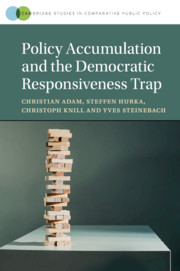Book contents
- Policy Accumulation and the Democratic Responsiveness Trap
- Cambridge Studies In Comparative Public Policy
- Policy Accumulation and the Democratic Responsiveness Trap
- Copyright page
- Contents
- Figures
- Tables
- Preface
- 1 Policy Accumulation and the Democratic Responsiveness Trap
- 2 Policy Accumulation: Concept and Measurement
- 3 Policy Accumulation: A Uniform Trend in Democratic Policy Making
- 4 The Threat to Our Ability to Talk “Policy”, Not “Politics”
- 5 The Threat to Effective and Even Policy Implementation
- 6 The Threat to Evidence-Based Policy Making
- 7 Ways Toward Sustainable Policy Accumulation
- Appendix
- Notes
- References
- Index
6 - The Threat to Evidence-Based Policy Making
Published online by Cambridge University Press: 25 March 2019
- Policy Accumulation and the Democratic Responsiveness Trap
- Cambridge Studies In Comparative Public Policy
- Policy Accumulation and the Democratic Responsiveness Trap
- Copyright page
- Contents
- Figures
- Tables
- Preface
- 1 Policy Accumulation and the Democratic Responsiveness Trap
- 2 Policy Accumulation: Concept and Measurement
- 3 Policy Accumulation: A Uniform Trend in Democratic Policy Making
- 4 The Threat to Our Ability to Talk “Policy”, Not “Politics”
- 5 The Threat to Effective and Even Policy Implementation
- 6 The Threat to Evidence-Based Policy Making
- 7 Ways Toward Sustainable Policy Accumulation
- Appendix
- Notes
- References
- Index
Summary
- Type
- Chapter
- Information
- Policy Accumulation and the Democratic Responsiveness Trap , pp. 125 - 165Publisher: Cambridge University PressPrint publication year: 2019

